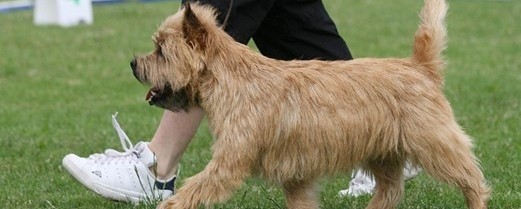Cairn Terrier Standard

This is a description of the AKC approved breed standard for the Cairn terrier.
General Appearance: That of an active, game, hardy, small working terrier of the short-legged class; very free in its movements, strongly but not heavily built, standing well forward on its forelegs, deep in the ribs, well coupled with strong hindquarters and presenting a well-proportioned build with a medium length of back, having a hard, weather-resisting coat; head shorter and wider than any other terrier and well furnished with hair, giving a general foxy expression.
Skull: Broad in proportion to the length with a decided stop and well furnished with hair on the top of the head, which may be somewhat softer than the body coat.
Muzzle: Strong but not too long or heavy.
Teeth: Large, mouth neither overshot nor undershot.
Nose: Black.
Eyes: Set wide apart, rather sunken, with shaggy eyebrows, medium in size, hazel or dark hazel in color, depending on body color, with a keen terrier expression
Ears: Small, pointed, well carried erectly, set wide apart on the side of the head. Free from long hairs.
Tail: Tail in proportion to head, well furnished with hair but not feathery. Carried gaily but must not curl over back. Set on at back level.
Body: Well muscled, strong, active body with well-sprung, deep ribs, coupled to strong hindquarters, with a level back of medium length, giving an impression of strength and activity without heaviness.
Shoulders, Legs and Feet: A sloping shoulder, medium length of leg, good but not too heavy bone; forelegs should not be out at elbows, and be perfectly straight, but forefeet may be slightly turned out. Forefeet larger than hind feet. Legs must be covered with hard hair. Pads should be thick and strong and dog should stand well up on its feet.
Coat: Hard and weather-resistant. Must be double-coated with profuse harsh outer coat and short, soft, close furry undercoat.
Color: May be of any color except white. Dark ears, muzzle and tail tip are desirable.
Ideal Size: Involves the weight, the height at the withers and the length of body. Weight for bitches, thirteen pounds; for dogs, fourteen pounds. Height at the withers, bitches nine and a half inches; dogs, ten inches. Length of body from fourteen and a quarter to fifteen inches from the front of the chest to back of hindquarters. The dog must be of balanced proportions and appear neither leggy nor too low to ground; and neither too short nor too long in body. Weight and measurements are for mature dogs at two years of age. Older dogs may weigh slightly in excess and growing dogs may be under these weights and measurements.
Condition: Dogs should be shown in good hard flesh, well muscled and neither too fat or thin. Should be in full good coat with plenty of head furnishings, be clean, combed, brushed and tidied up on the ears, tail, feet and general outline. Should move freely and easily on a loose lead, should not cringe on being handled, should stand up on their toes and show with marked terrier characteristics.
Faults:
- Skull: Too narrow in skull
- Muzzle: Too long and heavy a foreface; mouth overshot or undershot.
- Eyes: Too large, prominent, yellow and ringed are all objectionable.
- Ears: Too large, round at points, set too close together, set too high on the head; heavily covered with hair.
- Legs and Feet: Too light or too heavy bone. Crooked forelegs or out at the elbow. Thin ferrety feet; feet let down on the heel or to open and spread. Too high or too low on the leg.
- Body: Too short back and compact a body, hampering quickness of movement and turning ability. Too long, weedy and snaky a body, giving an impression of weakness.Tail set too low. Back not level.
- Coat: Open coats, blousy coats, too short or dead coats, lack of sufficient undercoat, lack of head furnishings, lack of hard hair on the legs. Silkiness or curliness. A slight wave permissible.
- Nose: Flesh or light-colored nose.
- Color: White on chest, feet or other parts of body.
Approved May 10, 1938~American Kennel Club Book of Standards